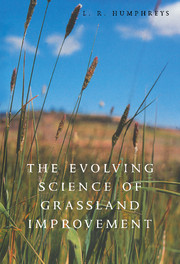Book contents
- Frontmatter
- Contents
- Preface
- Acknowledgements
- Abbreviations
- 1 Grassland improvement and environmental protection
- 2 The plant genetic base for grassland improvement
- 3 The nitrogen economy of grasslands
- 4 Growth and defoliation
- 5 Grassland ecology
- 6 Grazing management
- 7 Innovation, optimization and the realization of change
- Appendix The International Grassland Congresses
- References
- Index
Preface
Published online by Cambridge University Press: 19 September 2009
- Frontmatter
- Contents
- Preface
- Acknowledgements
- Abbreviations
- 1 Grassland improvement and environmental protection
- 2 The plant genetic base for grassland improvement
- 3 The nitrogen economy of grasslands
- 4 Growth and defoliation
- 5 Grassland ecology
- 6 Grazing management
- 7 Innovation, optimization and the realization of change
- Appendix The International Grassland Congresses
- References
- Index
Summary
Grasslands provide most of the world's milk and wool and much of the meat; they are also integrated in many regions with the production of annual and perennial crops. The threat of global warming accords a special premium to the carbon sequestered by grasslands. The rising expectations of the increasing global population place pressure on grasslands and on marginal lands developed for cropping. The greater demand for grassland products has been met in part by farmers applying the science of grassland improvement.
Grassland science has made notable advances in recent decades and as a holistic science its progress has been marked by changes in the emphasis given to its component disciplines, which have each made differing gains. The improvement of grassland rests upon plant and soil sciences, animal nutrition, systems theory, which generates decision support systems for management, and socio-economic perspectives of the role of the farmer and of institutional policies.
The International Grassland Congress, which has met on 17 occasions since its first meeting in 1927, has contributed to this evolution. The proceedings of its recent meetings provide markers for understanding the contemporary condition of grassland science and its probable future directions, whilst its earlier meetings indicate the origins and history of the major changes of emphasis and of the controversies in which scientists have been embroiled regarding grassland improvement and management.
Information
- Type
- Chapter
- Information
- The Evolving Science of Grassland Improvement , pp. xiii - xvPublisher: Cambridge University PressPrint publication year: 1997
